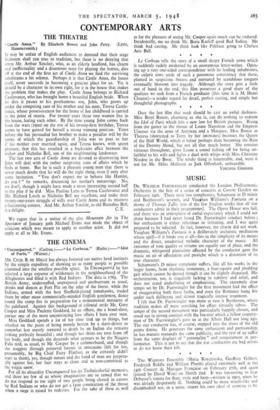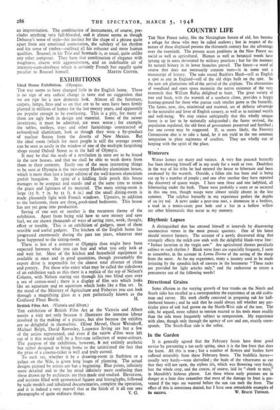MUSIC
DR. WILHELM FURTWANGLER conducted the London Philharmonic Orchestra in the first of a series of concerts at Covent Garden on February 29th. There were two symphonies, Schumann in D minor and Beethoven's seventh, and Vaughan Williams's Fantasia on a theme of Thomas Tanis (one of the few English works that all star conductors admit in their programmes). The Opera House was full, and there was an atmosphere of awful expectancy which I could not share because I had never heard Dr. Furtwangler conduct before ; but enthusiasm is either infectious or irritating, and I was quite prepared to be infected. In fact, however, the charm did not work. Vaughan Williams's Fantasia is a deliberately archaistic meditation whose spell—if it binds you at all—lies in the simplicity of its means and the direct, unadorned melodic character of the music. All extremes of tone quality or volume are equally out of place, and the dramatic, whispered pianissimo affected by the conductor gave the music an air of affectation and pastiche which is a distortion of its true character.
Schumann's D minor symphony suffers, like all his works in the larger forms, from rhythmic monotony, a four-square and plodding gait which cannot be denied though it can be slightly disguised. His orchestration, too, is singularly lacking in subtlety and relief, and does not stand underlining or emphasising. The extremely slow tempo set by Dr. Furtwangler for the first movement had the effect of exaggerating both these faults, and even the Romance hung fire under such deliberate and almost tragically intense treatment.
I felt that Dr. Furtwangler was more at ease it Beethoven, where tradition makes all mere searching for effect virtually taboo. The tempo of the second movement was particularly happily chosen, and stood out in strong contrast with the fox-trot which a fellow country- man of Dr. Furtwangler's gave us at the Albert Hall not long ago. The star conductor has, of course, stepped into the shoes of the old prima donna. He generates the same enthusiasm and partisanship, he has mutatis mutandis the same publicity, and the rest of us suffer from the same displays of " personality " and temperament in per- formance. This is not to say that the star conductors are bad artists or do not know their job.
* * * * The Wigmore Ensemble (Maria Korchinska, Geoffrey Gilbert, Frederick Riddle and William Pleeth) played extremely well at the 54th Concert de Musique Francaise on February 27th, and again (joined by David Wise) on March 2nd. It was interesting to hear Debussy's sonata for flute, viola and harp—written in 1915, when he was already desperately ill. Nothing could be more wraith-like and disembodied nor, in a sense, nearer his own ideal of seeming to be an improvisation. The combination of instruments, of course, pre- chides anything very full-blooded, and it almost seems as though Debussy's sense of style—his instinct for the shape of a phrase quite apart from any emotional connotation, the subtlety of his rhythm and his sense of timbre—outlived all his robuster and more human qualities. Roussel, in his Trio and Serenade is, as usual, quite unlike any other composer. They have that combination of elegance with toughness, charm with aggressiveness, and an indefinable air of intensity-cum-aloofness which is certainly French but equally quite































 Previous page
Previous page